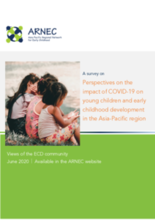This section includes resources for promoting nurturing care and positive development for children during the COVID-19 pandemic. Resources include those that offer guidance for parents and caregivers who are caring for children during lockdowns and quarantines who do not have access to schools and other services.
Displaying 41 - 50 of 128
This report presents the findings from a survey commissioned by the Asia-Pacific Regional Network for Early Childhood (ARNEC) to get insights and share experiences on the situation of children and the status of early childhood development (ECD) as a result of COVID-19 and the resulting containment and risk mitigation measures being implemented in countries in Asia-Pacific region.
This joint position statement calls for prioritising investment in early childhood services in light of the COVID-19 crisis.
This factsheet was designed by Save the Children to communicate the five key messages of parenting without violence, produced as part of the child protection COVID-19 response to protect children in their homes.
This webinar focused on the impacts of COVID-19 on the care system and care workers, how social protection systems are responding to the impacts of the pandemic on care work, and the extent to which the crisis and policy responses are gender-transformative.
This webinar aspires to share examples of successful approaches for supporting the most vulnerable families and young children during the COVID-19 pandemic in Italy, Belgium, Germany, and Ukraine.
The authors of this article review the evidence base on short- and long-term risks for children during early childhood development (ECD, defining this from prenatal to 8 years of age) and present evidence-based mitigating program and policy actions that may reduce these risks.
This guidance from the UK Department for Education outlines actions to be taken by educational providers - working together with other partners, where relevant, such as local authorities - to meet the needs of vulnerable children and young people during the COVID-19 pandemic.
Save the Children has developed these key messages, on Parenting without Violence, which can be adapted to a particular context. This resource was produced as part of the child protection COVID-19 response to protect children in their homes.
In this webinar hosted by the Center for the Study of Social Policy, experts discussed how family support professionals and organizations have adapted to serve families during the COVID-19 outbreak, and what we are learning that we will carry forward from this time.
This webinar focuses on standard 16 from the 2019 edition of the CPMS - strengthening family and caregiving environments - in the context of the current global COVID-19 pandemic.


